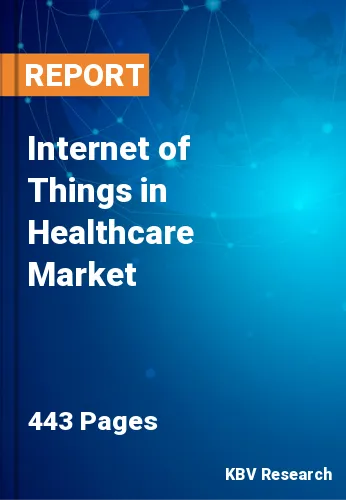
The Global Internet of Things in Healthcare Market size is expected to reach $606.7 billion by 2028, rising at a market growth of 16.5% CAGR during the forecast period.
The internet of things (IoT) is a network of physical devices that enables data exchange through connectivity. In addition, IoT is utilized in the healthcare industry for data collecting, research analysis, and the monitoring of electronic health records containing protected health information, personally identifiable information, and other machine-generated patient records. Moreover, IoT applications in healthcare simplify crucial activities, such as improving patient outcomes, while relieving some pressure on healthcare practitioners.
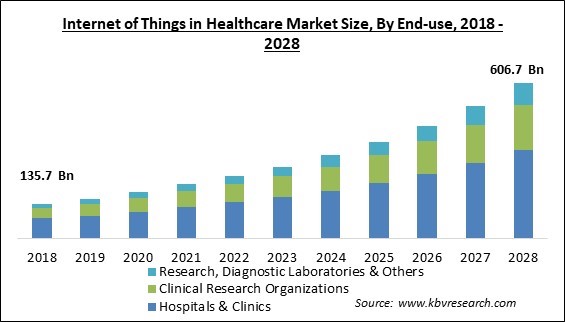
Internet of Things (IoT)-enabled gadgets have made remote monitoring possible in the healthcare industry, releasing the potential to keep patients safe and healthy and empowering physicians to provide exceptional care. The major factors contributing to the growth of the internet of things in healthcare market include technological advancements, rising occurrence of chronic diseases, including genetic diseases, respiratory diseases, COPD, and others, improved access to high-speed internet, and favorable government regulatory policies.
In addition, growing demands for cost-effective treatments & disease management, greater acceptance of smart devices & wearables, increased interest in self-health monitoring, and lower healthcare costs with advanced and cost-effective IoT in healthcare devices & solutions. The healthcare industry likely benefits from the Internet of Things (IoT), driven by digital transformation and technological innovation. The healthcare industry is expected to benefit from the growing emphasis on patient participation and patient-centric care, as well as the necessity to implement cost-control measures. The market is expected to be propelled by factors such as the rise of high-speed network technologies for IoT connection and the increasing geriatric population.
During the Covid-19 pandemic, vendors introduced cloud-based intelligent robot systems that continuously monitor vital signs, such as heart rate, temperature, and blood oxygen levels. In addition, the Union Health Ministry has launched the Aarogya Setu app in India. This smartphone application assists users in determining whether or not they are at risk for contracting COVID-19. Hence, COVID-19 has increased the need for the internet of things in healthcare market and gives the potential for manufacturers in various healthcare domain applications throughout the projection period. Thus, the market has benefited from the pandemic outbreak.
Hospitals and other healthcare facilities can now serve more patients at once while greatly reducing their workload due to the development of digital technologies like Artificial Intelligence and Machine Learning, which have enormous promise in the healthcare business. Using patient data and other information, AI can help medical personnel provide more accurate diagnoses and treatment recommendations. The market expansion is anticipated to be aided by the healthcare sector's rapid embrace of digital infrastructure.
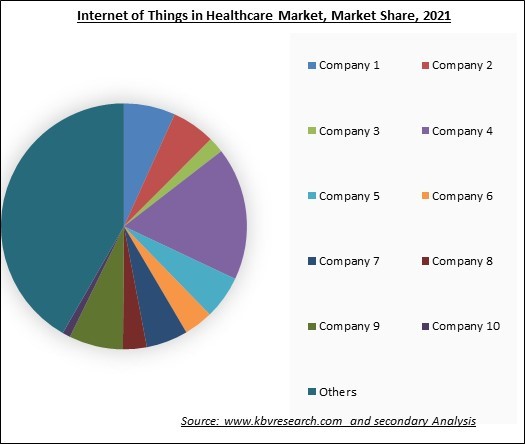
The leading players in the market are competing with diverse innovative offerings to remain competitive in the market. The illustration shows the percentage of revenue shared by some of the leading companies in the market. The leading players of the market are adopting various strategies in order to cater demand coming from the different industries. The key developmental strategies in the market are Partnerships & Collaborations.
Wearable Internet of Things devices is intended for disease prevention and health maintenance, particularly monitoring of weight & physical activity. Doctors/physicians can immediately monitor their patients with these gadgets for patient or disease management. Additionally, they can directly influence clinical decision-making. Hence, wearable Internet of Things devices is widely utilized in the healthcare industry to improve patient safety. This increased usage of wearable devices is anticipated to contribute to expanding the internet of things in healthcare market.
IoT is becoming more widely used, and with it comes a threat to data privacy & security, making the healthcare sector even more vulnerable to hacks. Also, a significant amount of private data is continuously transmitted by IoT devices. These assaults allow hackers to breach healthcare networks and expose Personal Health Information (PHI) belonging to patients and medical professionals. As technology develops, the likelihood of cyberattacks likewise rises. These issues may restrict IoT adoption in healthcare, impeding the market growth.
Based on component, the internet of things in healthcare market is segmented into medical devices, system & software and services. In 2021, the system & software segment covered a considerable growth rate in the internet of things in healthcare market. The creation of innovative connected technologies for the healthcare sector is receiving increasing operational player investments and credit for this growth from the technology advances driving it. Also, during the study period, the segment may benefit from the growing adoption of digital & connected systems in medical facilities.
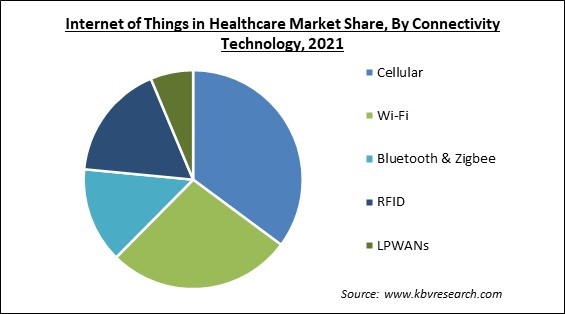
By Connectivity Technology, the internet of things in healthcare market is categorized into cellular, wi-fi, Bluetooth & Zigbee, LPWANs, and RFID. The LPWANs segment acquired a substantial revenue share in the internet of things in healthcare market in 2021. This is due to the unique characteristics of LPWAN, like low power consumption and long communication range for wireless monitoring and novel healthcare applications. For instance, LPWAN is ideally suited for telemedicine applications that provide data in the event of weather circumstances that increase mistake rates, such as inclement weather.
On the basis of application, the internet of things in healthcare market is fragmented into telemedicine, patient monitoring, connected imaging, clinical operations, medical management and others. The patient monitoring segment garnered a significant revenue share in the internet of things in healthcare market in 2021. The adoption of patient monitoring services is greatly influenced by the rising prevalence of chronic diseases, including cancer, diabetes, and congestive heart failure, which is anticipated to increase the demand for IoT solutions in the healthcare industry. Moreover, the rising cost of modern medical equipment, the rising geriatric population, and the increasing need for home healthcare services drive the demand for patient monitoring.
Based on end-use, the internet of things in healthcare market is classified into hospitals & clinics, clinical research organizations, research & diagnostic laboratories and others. The hospitals & clinics segment held the highest revenue share in the internet of things in healthcare market in 2021. The enhanced operational & functional efficiency realized by hospitals due to IoT is a key driver driving market expansion. These solutions, for instance, aid hospitals in managing real-time communication, medical records and billing, hospital workflows, and medication compliance, enhancing overall operational efficiency.
| Report Attribute | Details |
|---|---|
| Market size value in 2021 | USD 212.2 Billion |
| Market size forecast in 2028 | USD 606.7 Billion |
| Base Year | 2021 |
| Historical Period | 2018 to 2020 |
| Forecast Period | 2022 to 2028 |
| Revenue Growth Rate | CAGR of 16.5% from 2022 to 2028 |
| Number of Pages | 443 |
| Number of Table | 684 |
| Report coverage | Market Trends, Revenue Estimation and Forecast, Segmentation Analysis, Regional and Country Breakdown, Competitive Landscape, Market Share Analysis, Companies Strategic Developments, Company Profiling |
| Segments covered | Component, Technology, Application, End-use, Region |
| Country scope | US, Canada, Mexico, Germany, UK, France, Russia, Spain, Italy, China, Japan, India, South Korea, Singapore, Malaysia, Brazil, Argentina, UAE, Saudi Arabia, South Africa, Nigeria |
| Growth Drivers |
|
| Restraints |
|
Region wise, the internet of things in healthcare market is analyzed across North America, Europe, Asia Pacific and LAMEA. In 2021, the North America region led the internet of things in healthcare market by generating the largest revenue share. Increased utilization of telehealth, mHealth, e-prescribing, and other HC IT technologies in response to COVID-19, as well as rising government mandates and support for IoT solutions in healthcare, are the key growth drivers for the market. In addition, the rise in hospitals, advanced research institutions, and medical device makers has positively affected market expansion.
Free Valuable Insights: Global Internet of Things in Healthcare Market size to reach USD 606.7 Billion by 2028
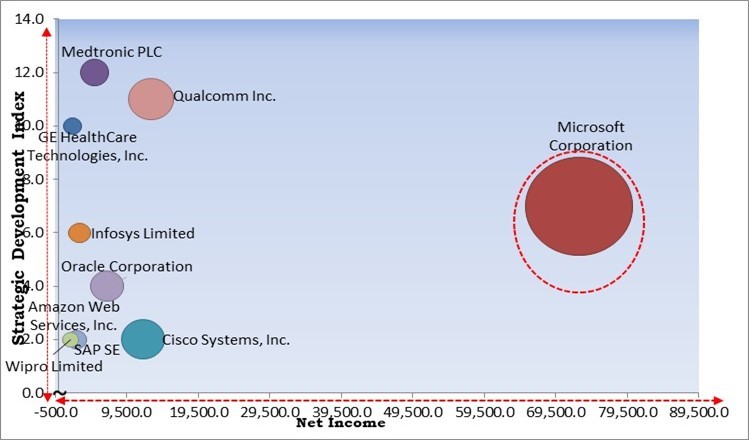
The major strategies followed by the market participants are Partnerships. Based on the Analysis presented in the Cardinal matrix; Microsoft Corporation is the major forerunner in the Internet of Things in Healthcare Market. Companies such as Qualcomm Inc., Medtronic PLC, and GE HealthCare Technologies, Inc. are some of the key innovators in Internet of Things in Healthcare Market.
The market research report covers the analysis of key stake holders of the market. Key companies profiled in the report include Medtronic PLC, Cisco Systems, Inc., GE HealthCare Technologies, Inc., Microsoft Corporation, SAP SE, Infosys Limited, Oracle Corporation (Cerner Corporation), Qualcomm Inc. (Qualcomm Technologies, Inc.), Amazon Web Services, Inc. (Amazon.com, Inc.), Wipro Limited, and Intel Corporation.
By End-use
By Application
By Connectivity Technology
By Component
By Geography
The global Internet of Things in Healthcare Market size is expected to reach $606.7 billion by 2028.
Rising adoption of digital technologies in healthcare sector are driving the market in coming years, however, Increase in attack surfaces and internet disruption leading to rugged IoT device performance restraints the growth of the market.
Medtronic PLC, Cisco Systems, Inc., GE HealthCare Technologies, Inc., Microsoft Corporation, SAP SE, Infosys Limited, Oracle Corporation (Cerner Corporation), Qualcomm Inc. (Qualcomm Technologies, Inc.), Amazon Web Services, Inc. (Amazon.com, Inc.), Wipro Limited, and Intel Corporation.
The Telemedicine segment acquired maximum revenue share in the Global Internet of Things in Healthcare Market by Application in 2021 thereby, achieving a market value of $168.6 billion by 2028.
The Medical Devices segment is leading the Global Internet of Things in Healthcare Market by Component in 2021 thereby, achieving a market value of $218.9 billion by 2028.
The North America market dominated the Global Internet of Things in Healthcare Market by Region in 2021, and would continue to be a dominant market till 2028; thereby, achieving a market value of $254.8 billion by 2028.
Our team of dedicated experts can provide you with attractive expansion opportunities for your business.
